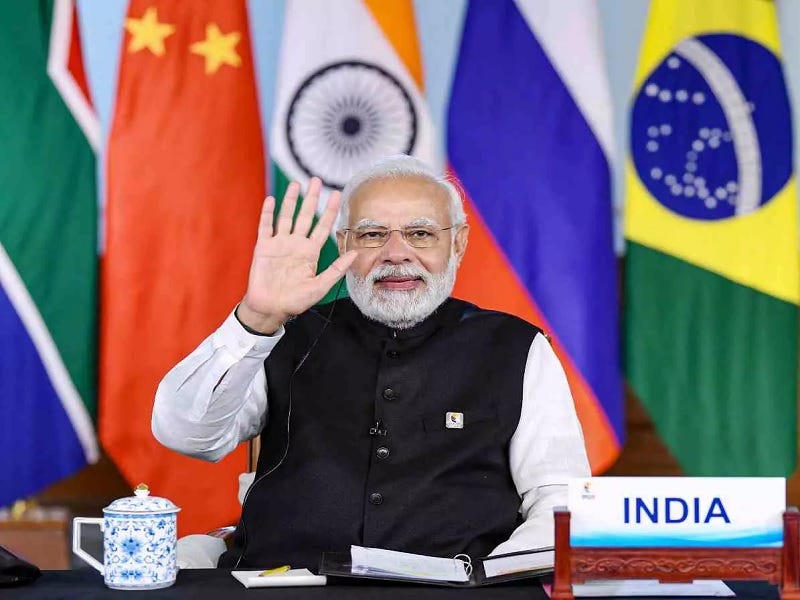Three Recent Articles Prove That The World Is Finally Appreciating India’s Balancing Act
Granted, they’re not perfect representations of the grand strategic insight that I spent the last nearly nine months articulating to my audience, but they nevertheless uncannily align with it so closely that there’s no doubt that my work over the last ¾ of a year influenced their views.
India’s pragmatic policy of principled neutrality towards the New Cold War between the US-led West’s Golden Billion and the jointly BRICS- and SCO-led Global South of which it’s a part, particularly the NATO-Russian dimension thereof via their ongoing proxy war in Ukraine, is finally being appreciated. It’s been hitherto misportrayed by both putatively multipolar-friendly voices like former Indian Ambassador M.K. Bhadrakumar and passionately unipolar forces like CNN, each in pursuit of their own ends.
Those twisted takes are now gradually being corrected and thus aligning a lot closer to objective reality as evidenced by three recent articles from India’s ThePrint, CNN, and the US’ influential Stimson Center, each of which channel the spirit of my prior assessments that were proven accurate in hindsight. The last-mentioned were summarized in the following three analyses, which the reader should at the very least skim in order to understand why the preceding three were clearly influenced by my insight:
* “Korybko To Happymon Jacob: Russian-Indian Ties Are Qualitatively Evolving”
(^^^ the several broken hyperlinks within can be accessed via Google search or Internet Archive)
* “Korybko To The Hindu: Your Editorial Won’t Change India’s Principled Neutrality”
* “Korybko To Mihir Sharma: India’s Balancing Act Is Approaching Perfection”
I’ve consistently argued that India aspires to become the irreplaceable balancing force in the global systemic transition to multipolarity, to which end it decisively intervened to preemptively avert Russia’s potentially disproportionate dependence on China in the face of unprecedented Western pressure. Its dual-tripolarity grand strategy successfully accomplished both objectives, which in turn derailed China’s superpower trajectory. More insight into this can be gleaned from all of the preceding hyperlinks.
It's precisely these assessments that were embraced by ThePrint’s Lt Gen P R Shankar retd in his piece about how “The US-led global order is tottering. It is India’s time to shine as a balancing ‘third pole’”; CNN’s Rhea Mogul in her article titled “G20’s criticism of Russia shows the rise of a new Asian power. And it isn’t China” (which I critiqued here); and the Stimson Center’s Samuel Ng in his piece about “The China Factor in India’s Muted Ukraine Response”.
Granted, they’re not perfect representations of the grand strategic insight that I spent the last nearly nine months articulating to my audience, but they nevertheless uncannily align with it so closely that there’s no doubt that my work over the last ¾ of a year influenced their views. This is especially so regarding Lt Gen P R Shankar retd’s piece with respect to the foundational piece that I wrote for the Russian International Affairs Council last December about “The Neo-NAM: From Vision to Reality”.
I humbly concede that it’s possible for multiple minds to independently arrive at similar conclusions, but there’s no denying that my work pioneered this approach towards analyzing India’s grand strategy in what can be described as the present “Age of Complexity”. After all, it indisputably paved the way after far predating the three cited articles from earlier this week that channeled practically the exact same insight into this globally significant subject of research that had thus far been grossly misportrayed.
Looking forward, objective observers should build upon my aforementioned works and those three comparatively more popular ones shared by Indian Mainstream Media (MSM), its US counterpart, and a top American think tank in order to better prognosticate that Great Power’s forthcoming policies. India has indeed become the kingmaker in the New Cold War, the unparalleled role of which is finally being appreciated by influential opinionmakers, which opens up exciting opportunities for all stakeholders.



Turkey seems to have gained status in the past year as a player in the global strategies being played out by the Gold Billion and the BRICS. While frequently derided by Americans as a spoiler and often questioned as a NATO ally, Erdogan is feeling his oats. I'd like to learn more about the political dynamics in Turkey and how that nation's role may shape up in the future.